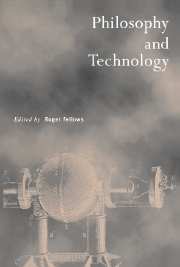Book contents
- Frontmatter
- Contents
- Introduction
- Technology: Liberation or Enslavement?
- Do the Successes of Technology Evidence the Truth of Theories
- Instrument and Reality: The Case of Terrestrial Magnetism and the Northern Lights (Aurora Borealis)
- Realism and Progress: Why Scientists should be Realists
- Quantum Technology: Where to Look for the Quantum Measurement Problem
- Welcome to Wales: Searle on the Computational Theory of Mind
- Acts, Omissions and Keeping Patients Alive in a Persistent Vegetative State
- Technology and Culture in a Developing Country
- Art and Technology: An Old Tension
- Tools, Machines and Marvels
- Values, Means and Ends
- Question Time
- Notes on Contributors
- Index of Names
Technology: Liberation or Enslavement?
Published online by Cambridge University Press: 27 October 2009
- Frontmatter
- Contents
- Introduction
- Technology: Liberation or Enslavement?
- Do the Successes of Technology Evidence the Truth of Theories
- Instrument and Reality: The Case of Terrestrial Magnetism and the Northern Lights (Aurora Borealis)
- Realism and Progress: Why Scientists should be Realists
- Quantum Technology: Where to Look for the Quantum Measurement Problem
- Welcome to Wales: Searle on the Computational Theory of Mind
- Acts, Omissions and Keeping Patients Alive in a Persistent Vegetative State
- Technology and Culture in a Developing Country
- Art and Technology: An Old Tension
- Tools, Machines and Marvels
- Values, Means and Ends
- Question Time
- Notes on Contributors
- Index of Names
Summary
The week, twenty-five years ago, of the Apollo spacecraft's return visit to the moon was described by Richard Nixon as the greatest since the Creation. Across the Atlantic, a French Academician judged the same event to matter less than the discovery of a lost etching by Daumier. Attitudes to technological achievement, then, differ. And they always have. Chuang-Tzu, over 2,000 years ago, relates an exchange between a Confucian passer-by and a Taoist gardener watering vegetables with a bucket drawn from a well. ‘Don't you know that there is a machine with which 100 beds are easily watered in a day?’—‘How does it work?’—‘It's a counter-balanced ladle’—‘Too clever to be good… all machines have to do with formulae, artificiality [which] destroy native ingenuity… and prevent the Tao from residing peacefully in one's heart’. ‘Engines of mischief’, in the words of the Luddite song, or testaments to ‘the nobility of man [as] the conqueror of matter’, in those of Primo Levi, the products of technology continue to inspire phobia and philia.
Familiar to the point of cliché, in such debates, has been the rhetoric of liberation and enslavement. Karl Popper judges nuclear power to have shown that our vaunted ‘control of nature’ is ‘apt to enslave us rather than make us free’; while, for Radhakrishnan, further east, the technology by which man ‘strove to emancipate himself from bondage to nature’ has now become ‘the master’.
- Type
- Chapter
- Information
- Philosophy and Technology , pp. 7 - 18Publisher: Cambridge University PressPrint publication year: 1995
- 8
- Cited by

